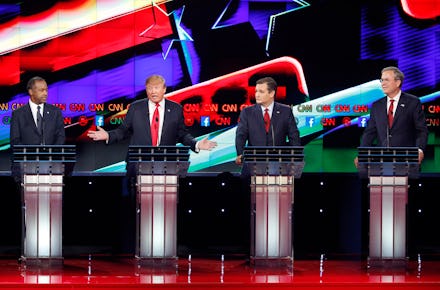The One Deadly Threat to America That Wasn’t Discussed at All at the Republican Debate

Republican presidential candidates sparred Tuesday evening over how best to combat the Islamic State terrorist group, haggling over military intervention, government surveillance and frontrunner Donald Trump's proposal to shut down "areas" of the internet.
But while the threat from the Islamic State, also known as ISIS or ISIL, consumed the bulk of the face-off at the Venetian hotel and casino in Las Vegas, both the CNN moderators and the candidates wholly ignored a larger terrorist menace: The threat posed not by Islamic terrorists but by homegrown white terrorists.
The numbers: According to data from the centrist New America Foundation, Islamic jihadists have killed 45 people in a total of nine attacks on American soil since Sept. 11, 2001, while far-right terrorists have killed 48 people in 18 total attacks in that period.
White terrorism moved briefly to the fore of the national discussion this summer after Dylann Storm Roof, a white supremacist gunman, shot and killed nine people at an African-American church in Charleston, South Carolina. In a chilling manifesto unearthed after the June shooting, Roof extolled white supremacy and waxed poetic for segregation — attitudes shared by other prominent white terrorists, including Frazier Glenn Miller, a Neo-Nazi who attacked a Jewish community center in Overland Park, Kansas, in 2014.
Asked to assess their top threats, most law enforcement officials identify anti-government violence, not jihadist terrorism. As the Independent noted in June, a University of North Carolina and Duke University survey of 382 police departments nationwide found that 74% considered anti-government extremism a chief challenge, compared with only 39% who said the same for Islamic terrorism.
A distorted national conversation: It's understandable that ISIS would consume much of the political conversation following the ISIS-coordinated attacks in Paris last month and the ISIS-inspired massacre in San Bernardino, California, on Dec. 2, but the silence on white terrorism is deafening in light of such figures.
The Paris attacks led the House of Representatives to pass legislation halting the flow of predominantly Muslim refugees into the U.S. from Syria and Iraq, while GOP candidates like Ted Cruz and Jeb Bush suggested that the country only allow Christian refugees.
After Syed Rizwan Farook and Tashfeen Malik killed 14 and injured 21 in San Bernardino, Trump took the debate to a xenophobic new level, calling for a "total and complete shutdown" of any foreign Muslims entering the U.S.
But we didn't hear candidates call for increased scrutiny of white anti-abortion activists after extremist Robert Dear shot and killed three last month at a Planned Parenthood facility in Colorado Springs, Colorado. Nor did Roof's massacre prompt a rash of legislation cracking down on white supremacist political activity.
Indeed, the very notion that white people also commit terrorism is beyond the pale in many quarters: In 2009, the Department of Homeland Security issued a report on right-wing extremism and its upsurge amid the Great Recession. Following a conservative outcry, DHS withdrew the report, foreclosing even a conversation on the subject.
Meanwhile, Ted Cruz saw fit to imply Tuesday night that while not all Muslims are terrorists, all terrorists are Muslim.
"I'm reminded of what FDR's grandfather said — he said all horse thieves are Democrats, but not all Democrats are horse thieves," Cruz said. "In this instance, there are millions of peaceful Muslims across the world in countries like India where there is not the problems we are seeing in nations that have territory controlled by al-Qaida or ISIS, and we should direct at the problem, focus on the problem and defeat radical Islamic terrorism."
Such rhetoric may be par for the course from a leading candidate seeking the nomination of a party whose voters, polls suggest, support Trump's Muslim ban. But CNN's moderators had an opportunity to point out that Muslims aren't the only terrorists; they're not even the most common terrorists. Once again, we avoided that conversation.